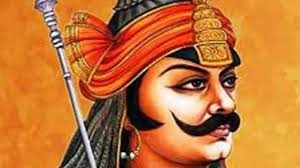Although, many brave heroes have taken birth in Mati, full of stunning and vigorous, chanting, religious, and religious qualities of Rajasthan. Maharana Pratap is one of the few rulers whose stories of spirit. Listening to the glorious struggle saga, everyone’s hair gets erected.
Amar Rashtriya Nayak, steadfast pledge and freedom-fighting adventurer Ranbankur Maharana Pratap. Who fought the Mughals for a lifetime, was allowed to wander from jungle to forest, but in no circumstances and temptation was it acceptable to accept Akbar’s subjection.


 Maharana Pratap was a diplomat, politician, unique in mental and physical ability. He was 7 feet in length and weighed 110 kg and carried 72 kg chest armor, 81 kg spears, 208 kg two-weight swords.
Maharana Pratap was a diplomat, politician, unique in mental and physical ability. He was 7 feet in length and weighed 110 kg and carried 72 kg chest armor, 81 kg spears, 208 kg two-weight swords.  But apart from them, Maharana Pratap did not accept Akbar’s nemesis. Shocked by this, Akbar sent his army under the chairmanship of Mansingh and Jahangir to attack Mewar.
But apart from them, Maharana Pratap did not accept Akbar’s nemesis. Shocked by this, Akbar sent his army under the chairmanship of Mansingh and Jahangir to attack Mewar.  After hearing the news of Maharana Pratap’s death, Akbar’s eyes were filled with tears on seeing Pratap’s unwavering patriotism.
After hearing the news of Maharana Pratap’s death, Akbar’s eyes were filled with tears on seeing Pratap’s unwavering patriotism. 